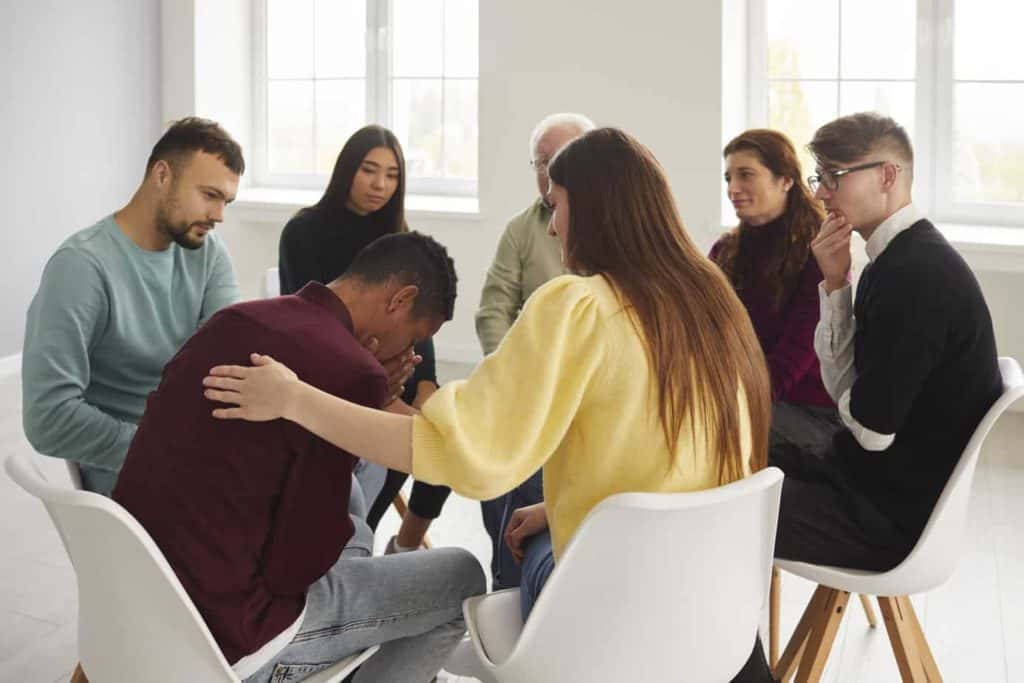What is Narcotics Anonymous?
Narcotics Anonymous was established in response to the success of Alcoholics Anonymous. Narcotics Anonymous is a global, community-based organization with a multi-lingual and multicultural membership. It was founded in 1953, and our membership growth was minimal during our initial twenty years as an organization.
Today, NA members hold nearly 67,000 meetings weekly in 139 countries. NA offers recovery from the effects of addiction through working a twelve-step program, including regular attendance at NA meetings. The goal of NA is to create a community where people with substance abuse issues help each other on the road to recovery.
The only requirement to become a member of NA is a desire to overcome your addiction. NA groups don’t make a distinction between any type of drug, including alcohol. They also recognize that polysubstance dependence is common. Therefore, any addict who wants to recover is welcome. Moreover, membership is free and has no affiliation with any organizations outside of NA, including governments, religions, law enforcement groups, or medical and psychiatric associations.

James Patrick Kinnon, known as “Jimmy K.”, is commonly credited with founding Narcotics Anonymous (NA) in 1953 in Los Angeles, California, to help its members stop using addictive substances. No part of NA is compulsory or required. NA meetings are either “open,” for members and non-members, or “closed” (for members and prospective members only). Visitors who are not addicted themselves are invited to attend open meetings.

Get Your Life Back
Find Hope & Recovery. Get Safe Comfortable Detox, Addiction Rehab & Dual Diagnosis High-Quality Care.
Hotline(844) 597-1011History of NA
Narcotics Anonymous is a global, community-based organization with a multi-lingual and multicultural membership. NA was founded in 1953, and our membership growth was minimal during our initial twenty years as an organization. Since the publication of our Basic Text in 1983, the number of members and NA meetings has increased dramatically. Today, NA members hold nearly 76,000 meetings weekly in 143 countries. We offer recovery from the effects of addiction through working a twelve-step program, including regular attendance at group meetings.
The group atmosphere provides help from peers and offers an ongoing support network for addicts who wish to pursue and maintain a drug-free lifestyle. Our name, Narcotics Anonymous, is not meant to imply a focus on any particular drug; NA’s approach makes no distinction between drugs including alcohol. Membership is free, and we have no affiliation with any organizations outside of NA including governments, religions, law enforcement groups, or medical and psychiatric associations. Through all of our service efforts and our cooperation with others seeking to help addicts, we strive to reach a day when every addict in the world has an opportunity to experience our message of recovery in his or her own language and culture.
Get Help. Get Better. Get Your Life Back.
Searching for Accredited Drug and Alcohol Rehab Centers Near You?
Even if you have failed previously and relapsed, or are in the middle of a difficult crisis, we stand ready to support you. Our trusted behavioral health specialists will not give up on you. When you feel ready or just want someone to speak to about therapy alternatives to change your life call us. Even if we cannot assist you, we will lead you to wherever you can get support. There is no obligation. Call our hotline today.
(844) 597-1011What to Expect at an NA Meeting?
“If you’re new to NA or planning to go to a meeting for the first time, it might be nice to know a little bit about what happens in our meetings. The information here is meant to understand what we do when we come together to share recovery. Moreover, the words we use and the way we act might be unfamiliar to you at first, but hopefully, this information can help you get the most out of your first NA meeting or help you feel more comfortable as you keep coming back.
Also, showing up early, staying late, and asking lots of questions before and after NA meetings will help you get the most out of every meeting you attend… This is according to Narcotics Anonymous (NA)[1]. People have all sorts of reasons for attending NA meetings, but the purpose of each NA meeting is to give members a place to share recovery with other addicts. If you are not an addict, look for an open meeting, which welcomes non-addicts. If you’re an addict or think you might have a drug problem, we suggest a meeting every day for at least 90 days to get to know NA members and our program….” NA [2].

What is an NA Meeting and Does NA Work?
Narcotics Anonymous has a proven track record of helping people stay sober. The 12 steps provide a framework for recovery, and the program is flexible enough to meet the needs of any individual. People in NA can benefit from sharing their experiences with others who understand what they are going through. They can also learn new coping mechanisms and strategies for staying sober. NA is a lifelong commitment, and people who attend NA meetings regularly are more likely to stay sober. The program provides support and guidance for people in all stages of recovery.
When it comes to NA meetings, researchers struggle to accurately assess the rates of success and failure because the hosting organizations strive to protect the anonymity of their members. However, according to the National Center for Biotechnology Information, 38% of those who participate in self-help recovery opportunities still attend the gatherings two years after completing treatment. The overwhelming 81% of active members also stay clean for at least 6 months, compared to 26% among those who do not participate in the NA program.
First-class Facilities & Amenities
World-class High-Quality Addiction & Mental Health Rehabilitation Treatment
Rehab Centers TourRenowned Addiction Centers. Serene Private Facilities. Inpatient rehab programs vary.
Addiction Helpline(844) 597-1011Proven recovery success experience, backed by a Team w/ History of:
15+
Years of Unified Experience
100s
5-Star Reviews Across Our Centers
10K
Recovery Success Stories Across Our Network
- Low Patient to Therapist Ratio
- Onsite Medical Detox Center
- Comprehensive Dual-Diagnosis Treatment
- Complimentary Family & Alumni Programs
- Coaching, Recovery & Personal Development Events
Benefits of Attending NA Meetings
NA meetings can be your lifeline to long-term recovery and a more positive quality of life with benefits like:
- Frequent NA meetings and availabilities in your local area.
- Support from people who share common interests, goals, and experiences, can help you prevent or overcome difficulties and gain hope in your outlook for the future.
- A chance to reach out and access resources you may not find anywhere else such as a sponsor, agency referrals, motivation support, and services to help keep you going in the right direction.
- Being able to share experiences and gain positive and productive feedback as you follow the 12-Step program.
- Gaining confidence through education and witnessing the success of others who have been where you are or are doing the same things.
- N.A. can be used in conjunction with other treatments to enhance your recovery progress.
World-class, Accredited, 5-Star Reviewed, Effective Addiction & Mental Health Programs. Complete Behavioral Health Inpatient Rehab, Detox plus Co-occuring Disorders Therapy.
CALL(844) 597-1011End the Addiction Pain. End the Emotional Rollercoaster. Get Your Life Back. Start Drug, Alcohol & Dual Diagnosis Mental Health Treatment Now. Get Free No-obligation Guidance by Substance Abuse Specialists Who Understand Addiction & Mental Health Recovery & Know How to Help.
NA Meetings for Family Members
Addiction can have an isolating effect on the family as well as on the addict. Feelings of shame and guilt can drive family members to secrecy and isolation in an effort to hide the ongoing turmoil that addiction brings.
Families struggling with addiction also tend to have certain ingrained behavioral and communication styles that make it difficult to move forward in the recovery process. In effect, families must go through their own version of recovery in order to be free of addiction’s hold.
Family Anonymous meetings are modeled after Alcoholics Anonymous, an organization created in the 1930s to help alcoholics manage the day-to-day challenges of recovery. Like its predecessor, Family Anonymous meetings follow a 12 Step program designed to promote growth and personal development, according to the National Institute on Drug Abuse.
The principles and practices employed by Family Anonymous meetings offer a range of benefits for families living with addiction. Through regular attendance at Family Anonymous meetings, family members can obtain the support and direction needed to live full lives regardless of where the addict is at in his or her recovery.

Addiction Treatment and Detox
Now that we’ve answered that question “what is an NA meeting?”. It is never too late to seek help for yourself or a loved one. To determine the most effective ways to treat alcohol or drug addiction, it’s crucial to first get an accurate assessment of all the symptoms. When the symptoms have been evaluated by a mental health professional, it may be determined that another form of mental condition is present and needs a particular type of treatment.
Medically-Assisted Detox
Medical detox is often considered the first stage of treatment. It will help you navigate the complicated process of withdrawal, but it doesn’t address patterns of thought and behavior that contribute to drug use. Various treatment approaches and settings can help provide the ongoing support necessary to maintain long-term sobriety after you complete detox.
Cravings are very common during detox and can be challenging to overcome. This often leads to relapse. Constant medical care provided during inpatient rehab treatment helps prevent relapse. Clinicians can provide necessary medication and medical expertise to lessen cravings and the effects of withdrawals.
Psychotherapy
Several different modalities of psychotherapy have been used in the treatment of mental health disorders along with addiction, including:
- Cognitive Behavioral Therapy (CBT) – is an effective treatment that involves making changes in both the patterns of negative thoughts and the behavioral routines which are affecting the daily life of the depressed person for various forms of depression.
- Dialectical Behavior Therapy – is a comprehensive mental health and substance abuse treatment program whose ultimate goal is to aid patients in their efforts to build a life worth living. The main goal of DBT is to help a person develop what is referred to as a “clear mind.”
- Person-Centered Therapy – is a strategy that allows and encourages clients to understand and resolve their concerns in a safe, supportive environment.
- Solution Focused Therapy – is an approach interested in solutions that can be quickly implemented with a simple first step leading to further positive consequences.
Dual Diagnosis Treatment
Drug abuse and mental health disorders often co-occur. In many cases, traumatic experiences can result in a mental health disorder and substance abuse. Dual diagnosis rehabilitation treats both of these issues together. The best approach for the treatment of dual diagnosis is an integrated system. In this strategy, both the substance abuse problem and the mental disorder are treated simultaneously. Regardless of which diagnosis (mental health or substance abuse problem) came first, long-term recovery will depend largely on the treatment for both disorders done by the same team or provider.
Medication-Assisted Treatments
Medication-Assisted Treatments (MAT) for substance use disorders and mental health disorders are commonly used in conjunction with one another. This includes the use of medications and other medical procedures. During your rehab, the staff from your treatment facility will help you identify what caused your addiction and teach you skills that will help you change your behavior patterns and challenge the negative thoughts that led to your addiction.
If you or a loved one are struggling with long-term drug abuse and a co-occurring mental health condition such as depression, contact one of our helpful treatment specialists today. We Level Up can provide information on dual diagnosis and medical detox programs that may fit your specific needs.

Experience Transformative Recovery at We Level Up Treatment Centers.
See our authentic success stories. Get inspired. Get the help you deserve.
Start a New Life
Begin with a free call to an addiction & behavioral health treatment advisor. Learn more about our dual-diagnosis programs. The We Level Up Treatment Center Network delivers recovery programs that vary by each treatment facility. Call to learn more.
- Personalized Care
- Caring Accountable Staff
- World-class Amenities
- Licensed & Accredited
- Renowned w/ 100s 5-Star Reviews
We’ll Call You
Sources
[1][2]NA – https://na.org/
[3] NCBI – https://www.ncbi.nlm.nih.gov/pmc/articles/PMC3140338/
[4] Narcotics Anonymous » Drug Alcohol Addiction Rehab – We Level Up


